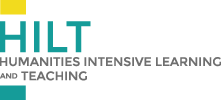Courses 2016 · IN
- Analyzing and Presenting Spatial Data
- Building and Sustaining a Digital Humanities Center
- Database Design for Visualization and Analysis
- Digital Pedagogy and Networked Learning
- Embodied Computing
- Exploring Humanities Textual Data with R
- Getting Started with Data, Tools, and Platforms
- High Performance Sound Technologies for Access and Scholarship
- Humanities Programming
- Text Analysis from Object to Interpretation
- Working with Scalar
Instructors
-
Warning: Undefined variable $page_object in /home/dhtraining/public_html/hilt/wp-content/themes/hilt-child/single-hilt_course.php on line 84
-
Tanya Clement
Assistant Professor, School of Information University of Texas at Austin
-
Stephen McLaughlin
PhD Candidate University of Texas at Austin
Description
*Please note this course has been cancelled for 2016*
There are hundreds of thousands of hours of important spoken text audio files, dating back to the nineteenth century and up to the present day. Many of these audio files, which comprise poetry readings, interviews of folk musicians, artisans, and storytellers, and stories by elders from tribal communities contain the only recordings of significant literary figures and bygone oral traditions. These artifacts are only marginally accessible for listening and almost completely inaccessible for new forms of analysis and instruction in the digital age. Participants will be introduced to essential issues that archivists, librarians, humanities scholars, and computer scientists and technologists face in understanding the nature of digital sound education and scholarship as well as the considerable possibilities that building an infrastructure for enabling such scholarship and teaching can enable. In order to understand these issues, participants will be introduced to advanced computational analytics with sound such as spectrogram creation and annotation as well as clustering, classification, and visualizations with sound collections. In particular, participants will be introduced to open source tools such as Praat, Sonic Visualizer, and ARLO for use in research and teaching. Using collections of sound such as PennSound, the world’s biggest collection of freely available poetry performances, as well as collections that the participants are interested in bringing, participants will begin to develop use cases and curriculum in which they use advanced technologies to augment their teaching with and research on sound. Experience with teaching and research with sound collections will be assumed, although familiarity with digital sound analysis is not a prerequisite.

